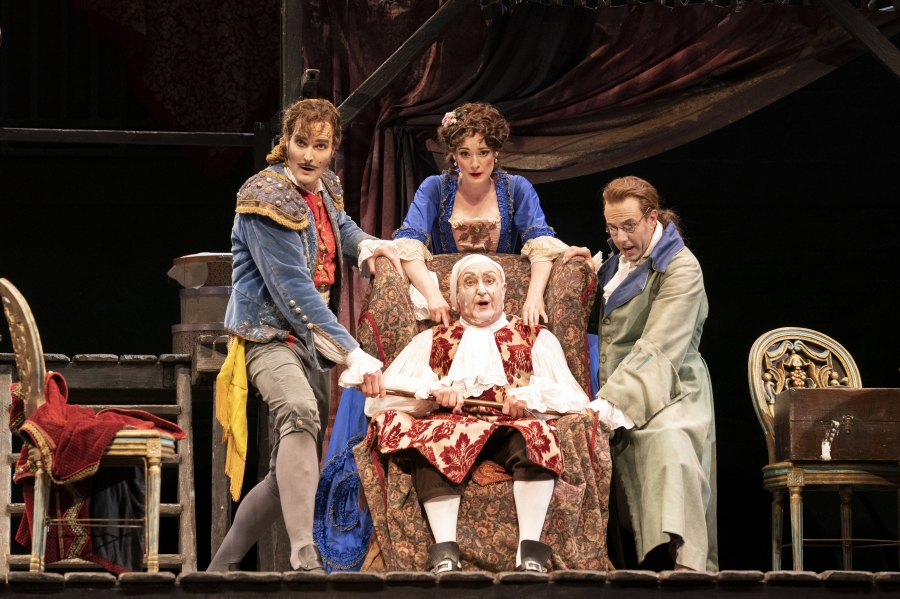
Deputy Editor Jasmine Sandhar and News Editor Ellen Knight write about The Barber of Seville, debating its choice of language but praising the comedy
After seeing the Welsh National Opera’s incredible production of Madam Butterfly merely two days ago, we had extremely high expectations for Gioachino Rossini’s The Barber of Seville, and in many ways, they were met or exceeded. Indeed, it is a laudable feat to have even managed both performances in such a short timespan – let alone to such an impressive standard – given the extreme differences between each opera. Whilst Madam Butterfly was almost overbearingly tragic, The Barber of Seville was full of fun and light-heartedness.
Set in 18th-century Spain, the plot follows the vicissitudes of the whirlwind romance between Count Almaviva (Nico Darmanin), who disguises himself as the poor student Lindoro, and Rosina (Heather Lowe), the ward of the controlling physician, Dr. Bartolo (Andrew Shore). Upon first inspection, this story is not unique: the same guardian-dependant relationship can be seen from as early as Shakespeare’s Othello right through to today’s era with literature as recent as Lemony Snicket’s A Series of Unfortunate Events.
However, the marked difference between this opera and other artistic works is the titular role of the barber, Figaro (Nicholas Lester). Whether he is cleverly scheming up ways to outwit Bartolo or sneaking around and eavesdropping in the shadows of the stage, Figaro is the character that brings this opera to life and allows Rossini’s work to transcend from mundanity to masterpiece.
The opera world has for years found itself embroiled in heated debate surrounding the translation of operas from their libretto’s original language to English
Amongst some members of the cast, there undoubtedly was a struggle to fully enunciate the hectically cluttered libretto, primarily due to the fact that it had contentiously been translated from Italian to English. The opera world has for years found itself embroiled in heated debate surrounding the translation of operas from their libretto’s original language to English. Purists will argue that this process is to the detriment of the performance – and in some ways, this is understandable.
The 1986 Robert Macdonald translation used here by the WNO has its brilliant moments, but at times feels a little contrived and even cheesy. The English language – at least to our ears – did not seem to flow quite as naturally as the Italian does, with moments where the audience could perhaps pick up on the difficulty to fully enunciate.
Yet we must remember that this is a comic opera, and the slightly over-the-top language of Macdonald’s translation does, in fact, reflect the melodrama and general silliness of the antics unfolding on stage. Moreover, the translation of opera makes it vastly more accessible – the jokes landed without the audience having to glance at the subtitles, and is undoubtedly better at drawing in a first-time opera-goer. Opera has long been the domain of the upper-classes, with attendees until relatively recently needing a working knowledge of Italian, or at the very least familiar with the plot. In performing a translated version, the WNO trades accuracy for audience engagement and laughter – and it certainly pays off.
The translation of opera makes it vastly more accessible – the jokes landed without the audience having to glance at the subtitles
Irrespective on your opinion of the performance’s chosen language, the saving grace of the show was undeniably Lowe, whose diction was impeccable and the vibrant tone of her mezzo-soprano register never failed to leave the audience enchanted as it floated over the stalls and right to the back of the upper circle. This was particularly prominent halfway through Act One, when Figaro encouraged Rosina to write a love letter to ‘Lindoro’, and Lowe managed to effortlessly guide Lester through their performance of the classic ‘Dunque io son’ duet in perfect harmony.
In fact, there were many memorable moments that kept us engaged. Take, for example, the arrival of Don Basilio (Keel Watson), Rosina’s music master, whose absurd facial expressions and booming bass-baritone voice left a significant impact, or even the very beginning of the opera, where the band of musicians serenading Rosina outside Bartolo’s house did not fail to amuse with their ridiculous air-playing. All of these scenes crescendoed into the collective chaos and confusion of ‘Mi par d’esser con la testa,’ where the overlapping voices created a fugue-like texture that created the cliff-hanger needed for the anticipation of Act Two.
There were many memorable moments that kept us engaged
Russell Craig’s multi-layered box set gives the performance a haphazard quality, with performers running up and down its stairs – and ladders – with practiced ease. The creaking timbers and hand-operated wind machine was reminiscent of a stage used by travelling players, fitting well with the somewhat chaotic air possessing the whole production.
Moreover, Craig’s set facilitated the physical comedy that really brought the production to life, particularly the antics of Figaro (Lester) and Almaviva (Darmanin). Furthermore, the presence of a 19th-century ‘audience’ sat near the wings and applauding the performers added to the stage-within-a-stage aspect, albeit cast members wandering around with wine glasses was occasionally a little distracting.
Of course, none of this would have been possible without the invaluable direction of conductor Frederick Brown, who not only led the orchestra with an unmatched vivacity, drawing out the beauty of the woodwind solo lines and heart-warming depth of the string section, but also kept the vocalists on the right track by exaggeratedly mouthing all their words. Whilst almost drowning out the performers at a few points, the orchestra was utterly brilliant, playing nigh-on consistently for nearly three hours with a consistent depth and warmth.
All in all, the production was not well-polished, but in a way that suited the subject matter. Whilst the opera is typically a place for poise and grace, The Barber of Seville has and will never conform to that convention – its fourth-wall-breaking finale promising to ‘leave the rest to Mozart,’ a charming addition that left the audience laughing their way out of the auditorium. The WNO managed to capture the essence of comedy, leaving the audience members’ fits of laughter echoing around the Birmingham Hippodrome, which is a sound that has been rather missed during this past year of pandemic gloom and doom.
Enjoyed this? Read more on Redbrick Culture!


Comments